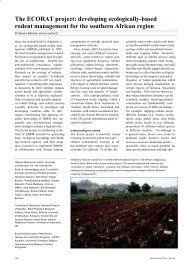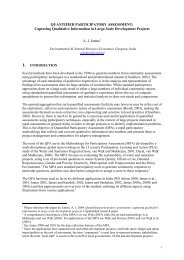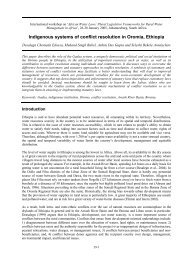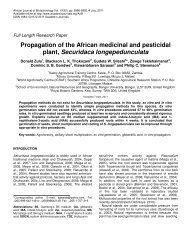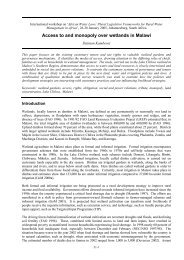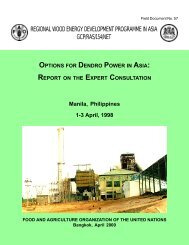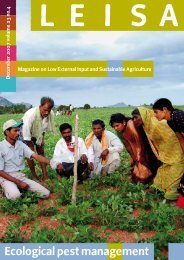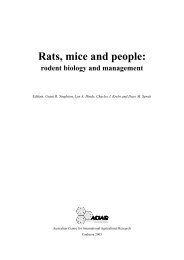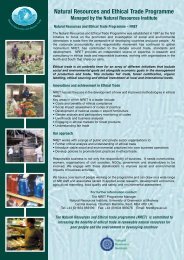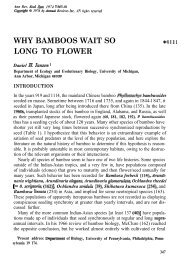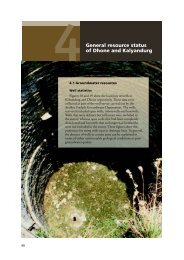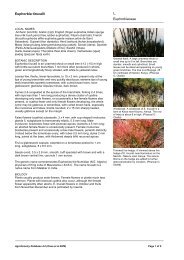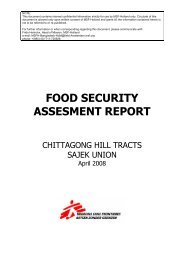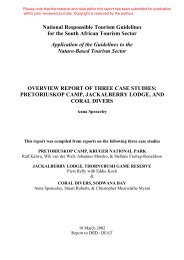Access to Rural Non-Farm Livelihoods - Natural Resources Institute
Access to Rural Non-Farm Livelihoods - Natural Resources Institute
Access to Rural Non-Farm Livelihoods - Natural Resources Institute
You also want an ePaper? Increase the reach of your titles
YUMPU automatically turns print PDFs into web optimized ePapers that Google loves.
4.3.3 Services<br />
There are a small number of service enterprises in the centre of the village, including bicycle<br />
and mo<strong>to</strong>rcycle mechanics, a bar selling local beer and locally distilled spirits, and two<br />
private clinics which offer simple diagnostic services and sell drugs. A few young men also<br />
deliver water on bicycles, and there are a small number of women who sell cooked snack<br />
foods, such as chapatis or small cassava and banana pancakes from the verandas of local<br />
shops, or <strong>to</strong> school children on their way home. A few very wealthy individuals, typically<br />
those with jobs at the district headquarters, own shops and houses in the trading centre, which<br />
they rent out <strong>to</strong> others.<br />
Box 9. Mr Onaldo, mechanic<br />
Mr Onaldo is 60 years old. He learnt <strong>to</strong> drive in Kampala, and worked as a driver in the<br />
Works Department at the district headquarters in Rakai from 1972 until the early 1990s, when<br />
his health deteriorated, and he had <strong>to</strong> s<strong>to</strong>p. Having learnt mechanics through his job, he used<br />
his salary <strong>to</strong> buy some <strong>to</strong>ols of his own and also ran a workshop outside their home working<br />
after hours and at weekends. There was actually relatively little business until the late 1980s,<br />
but he was able <strong>to</strong> support two of their children through diploma level studies, and others<br />
through secondary school. However, when he fell ill he also s<strong>to</strong>pped the mechanics business,<br />
and since then the household’s income has declined considerably. His wife, Jane, is concerned<br />
about secondary school fees for their younger children, as well as the expense of caring for<br />
four orphaned nephews and nieces who live with them. Their older children who have jobs or<br />
businesses in Kampala help with household commodities, such as sugar and soap, and she<br />
farms, but this is primarily for subsistence, and what she sells is not enough for secondary<br />
school fees. She likes the idea of having a retail shop <strong>to</strong> help generate income, but doubts that<br />
she will be able <strong>to</strong> get enough capital <strong>to</strong>gether <strong>to</strong> make this a reality.<br />
Box 10. Mrs Vamahame, pancake seller<br />
Mrs Vamahame is a well educated woman (S5). Her husband has a BSc, and teaches<br />
biochemistry and agriculture at the local secondary school. However, his small salary is not<br />
enough <strong>to</strong> support their nine children, some of whom are students at the secondary school.<br />
When he was transferred here in 1995 they bought a plot of land which she and the older<br />
children farm, along with some hired labourers, but although they use modern methods, the<br />
surplus for sale is not a lot. Mrs Vamahame therefore supplements the household’s income by<br />
making and selling cassava and banana pancakes. It was easy <strong>to</strong> get started using her existing<br />
kitchen utensils – she only needed <strong>to</strong> buy the cassava flour and oil. She sells the pancakes<br />
from her home which is right on the road <strong>to</strong> Sserinnya where many children go <strong>to</strong> school. She<br />
makes about 3,000 shillings per week in profit, which is comparable <strong>to</strong> what the family gets<br />
from farming in an average year. They are better off than many others, with a large house and<br />
money for batteries for their radio-cassette player, but Mr Vamahame is not satisfied, and<br />
aspires <strong>to</strong> becoming a coffee trader.<br />
Finally, Byakabanda is home <strong>to</strong> a relatively large number of salaried workers, such as<br />
teachers and government and NGO extension workers who work in and around the village,<br />
and administra<strong>to</strong>rs and political leaders who work at the district headquarters in nearby Rakai<br />
Town. Although salaries are generally low, they are typically among the better off, as they<br />
tend <strong>to</strong> be well educated and well connected and thus well informed about development<br />
opportunities. Furthermore, they are also often able <strong>to</strong> access formal credit against their<br />
salaries or <strong>to</strong> take advances, so most have profitable businesses on the side which often bring<br />
in more money than their salaries. They also benefit in that they are buffered against<br />
fluctuations in the local economy by their regular monthly incomes, and may have some<br />
expenses, such as healthcare, covered by their employers.<br />
42



